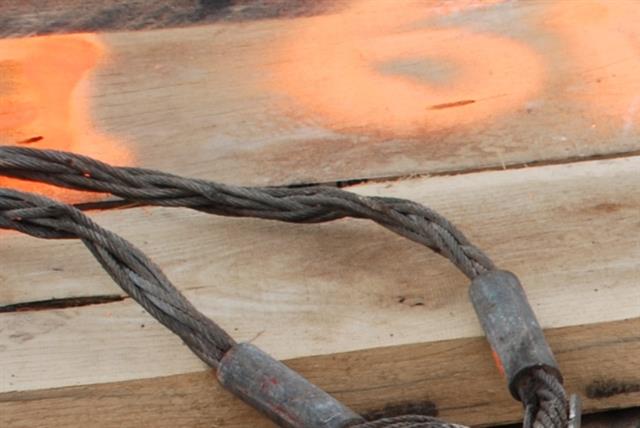 A safety cable hooked to an eyehole at the top of the attachment. |
A jury has awarded USD8,898,177 to the family of a worker who was fatally struck in the head when an unsecured load and attachment slipped from a JLG-Lull 944-E42 telehandler.
A nine-man, three-woman jury in Hidalgo County reached the conclusion on 12 March following a three-week trial before Judge Rodolfo Delgado in the 93rd district court in Edinburg.
Sergio Rincon Sr, 51, died on 10 April 2009 after the incident at a gas well drilling site in Pharr, Texas. Rincon was acting as a rigger for the load, and co-worker Juan Cantu was operating the telehandler on his first day using that equipment. Previously, Cantu operated a JLG-G9 telehandler.
"This was significant because the 'boom' and 'fork-tilt' controls were in opposite places on these two," says plaintiff's attorney John G Escamilla with the Edinburg office of the Watts Guerra Craft LLP law firm. "Out of force of habit, Cantu tilted the forks using the control he had used previously on the G9, but he actually tilted the forks down. Load capacity was not an issue. The design was designed to lift up to five tons (4,500 kg)."
Bishop Lifting Products Inc made the attachment, which was supposed to slide onto the forks, be secured to the carriage with a safety cable hooked to an eyehole at the top of the attachment and lift loads using a sling connected to an eyehole at the bottom. "It was designed to aid in lifting odd-shaped loads and equipment," Escamilla notes.
"The safety cable was not properly looped to the carriage and when the forklift operator inadvertently tilted the forks down, the load of drill collar slips weighing approximately 380 pounds (171 kg) and the attachment of about 127 pounds (57 kg) slid off the forks," Escamilla says.
Inadvertent tilting of the forks and improper securing of the attachment were the immediate causes, he says. "If (the attachment) had been properly secured, the tilting of the forks would have made no difference. Other causes were that the product came with no manual, instructions or warnings for this risk. Rincon had not completed rigger training. Both the attachment and the forklift were new to the end-users."
In applying responsibility, the jury assigned 47% to employer Nabors Drilling USA LP; 30% to equipment designer and manufacturer Bishop Lifting Products; 20% to well operator Shell Oil Co; and 1% each to Rincon, Cantu and Hertz Equipment Rental. Legally, the jury did not fault Cantu or Rincon.
"Essentially, the jury felt the employer did not adequately train Cantu on the new forklift or even tell him the new one had different controls," Escamilla says. Nabors Drilling "did not train either (worker) on the proper use of the lifting device. Nabors claimed that it relied on the manufacturer to provide the information it needed to train its crews, but this manufacturer (Bishop) provided nothing. There also were no warnings on the product at all when these men first used it. It had only been on site for three weeks."
Nabors Drilling USA of Houston, Texas is the largest subsidiary of Nabors Industries Ltd of Hamilton, Bermuda. Bishop Lifting Products is a division of BLP Group; both are based in Houston. Shell Oil in Houston is the US-based subsidiary of multinational Royal Dutch Shell plc of The Hague, the Netherlands.
In addition to Houston, Bishop Lifting Products has operations in Beaumont and Odessa, Texas; New Iberia, Louisiana; and Rock Springs, Wyoming.
While a judgment is yet to be signed, costs should be assessed against the defendants. Attorneys' fees come out of the total award. "I truly hope that much can be learned from this needless tragedy," Escamilla says. "I understand that Nabors and Shell have modified their practices when using forklift attachments. I can only hope that Bishop improves its warnings and provides information by way of manuals and/or instructions for its products."
Rincon's survivors are his widow and two adult children.